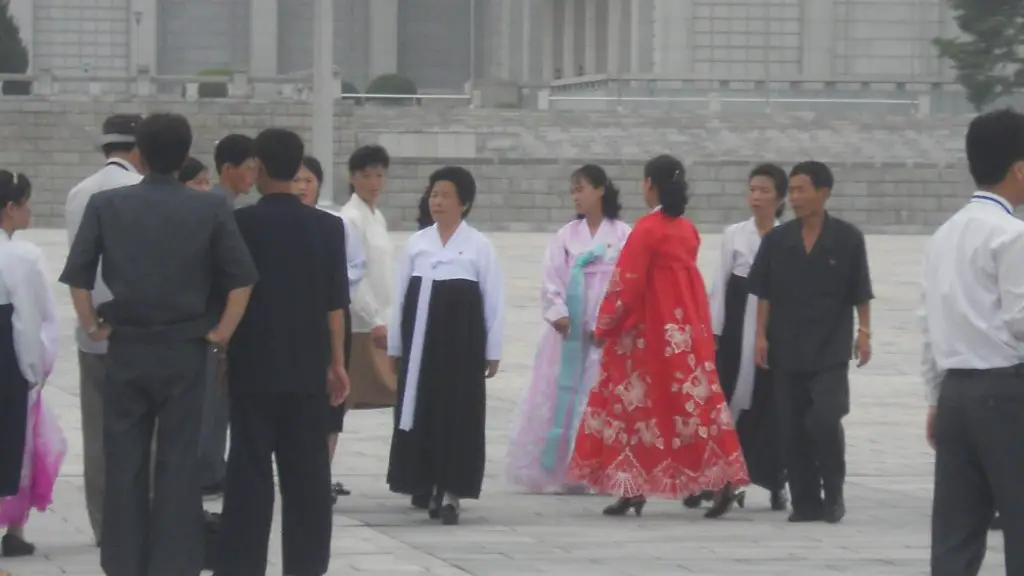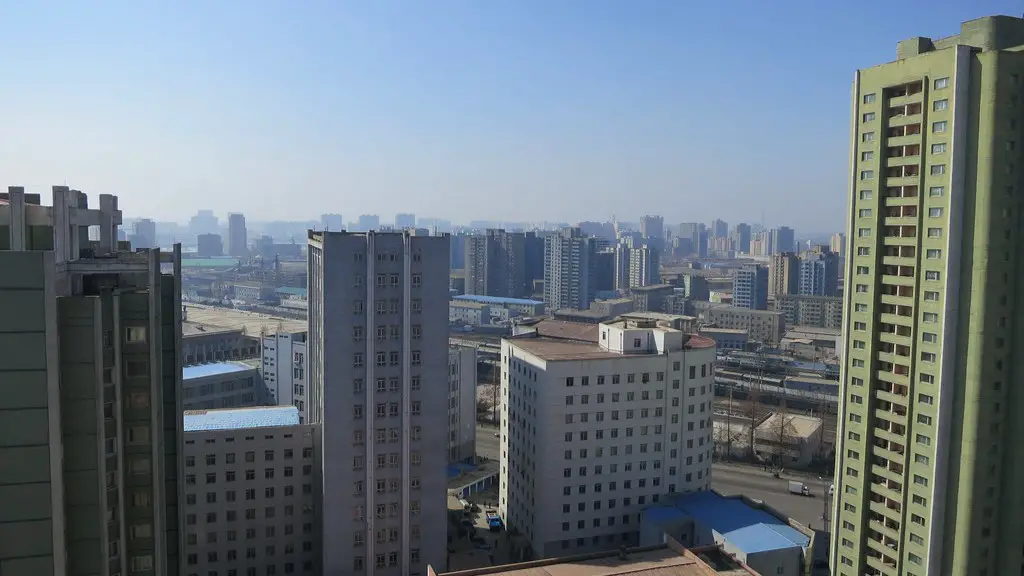The hermit nation of North Korea is one of the most isolated countries in the world, with little contact with the outside world. In spite of this, people from within the country stay in North Korea, regardless of the fact that their way of life is incredibly dangerous and restrictive by any international standards. While many of these people have to stay due to lack of options, there are others who continue to lead their lives in North Korea despite the risks.
Despite North Korea facing crippling international sanctions and being a country that is subject to intense governmental control, some of its citizens are content to stay in North Korea and do not attempt to escape the country and seek a better life abroad. The reasons behind this are varied and complex, with many citizens feeling a strong attachment to their homeland, as well as reluctant to abadon many of the cultural and social norm that they have grown up with.
The lack of access to alternative sources of information could also be a factor in why citizens choose to remain in North Korea. Limitations on the available news outlets means that people are restrict to state-run media, which presents a distorted picture of the outside world. This contributes to the perception of North Korea as being without rival, and also sustains a sense of national pride and loyalty towards the Kim Jong Un regime.
It is also important to consider some of the practical considerations that might come into play. People’s lives in North Korea are heavily interdependent and embedded in the country’s economic, social, and political systems. Furthermore, the risks associated in attempting to leave North Korea are considerable, with those who do so facing prison sentences and forced labor camps, or even faced with the death penalty.
For those who have grown up in North Korea, the country can be seen as their only home. Even if they were able to escape from the country, the risk and uncertainty of setting up a life elsewhere could be too much of an obstacle for them to overcome. It has been noted by social, political, and economic experts that for many people, it is simply easier to keep living in North Korea rather than to try and escape.
Psychological Impact Of Life In North Korea
It is important to note that life in North Korea is rarely easy. People routinely have to face difficulties in finding food, medicine, and other essential supplies, as well as being subject to intense surveillance by the North Korean authorities. These restrictions and basic difficulties of everyday life in North Korea can have profound impacts on the mental health of its citizens.
Citizens of North Korea are living with an inherent level of fear and uncertainty, particularly in regard to the government’s policy of censorship, which makes it difficult for news or information from the outside world to enter the country. This feeling of uncertainty can be psychologically damaging, as those who remain in North Korea are essentially powerless in the face of a totalitarian regime.
This sense of fear and powerlessness can be a major contributing factor in why people stay in North Korea, as well as a significant obstacle in convincing people to leave the country. It can be incredibly traumatic for those living in North Korea to leave the safety of their homeland and venture into the unknown, which is a potential barrier to many citizens who could otherwise escape.
Merely living in North Korea can have a damaging psychological impact on its citizens. The combination of the threat of violence and the inability to access the outside world can create a sense of dread and powerlessness, which can be a powerful deterrent to any effort to escape. This can make people feel resigned to their fate, and is likely to be a major factor in why people stay in North Korea despite its dangers.
Economic Impact Of Life In North Korea
The North Korean economy is highly underdeveloped and reliant on government subsidies and other state-run programs. This has caused the average income of its citizens to be drastically reduced, which is another factor hampering the prospects of North Korea citizens making an escape.
North Korea’s economy is further hampered by the strict international sanctions imposed on the country, which prevent it from engaging in much of the international trade it needs to survive. This has resulted in the citizens of North Korea having to resort to informal trade, bartering, and other means of subsistence in order to make ends meet.
Furthermore, the lack of access to international loans, aid, and grants renders the economy of North Korea completely reliant on the government. This lack of economic independence also restricts the options of North Korea’s citizens, with many having no choice but to stay in the country if they want to make a living.
The economic situation in North Korea also leads to an increased sense of loyalty to the government, or to the Kim Jong Un regime, as this is seen as the only way to guarantee a steady income and standard of living for its citizens. For many people, this has become a major factor in them staying in North Korea.
Social Impact Of Life In North Korea
The social customs and norms that have developed in North Korea have also become important factors in why people stay in the country. These customs are tightly interwoven and deeply rooted into the fabric of the country’s society, with citizens feeling a strong sense of attachment and loyalty to the country, despite its dangers.
The customs and rituals that have developed in North Korea over the years have also become a point of pride for its citizens, which could be a contributing factor as to why people choose to stay in the country. People are likely to be very reluctant to abandon these customs, which are an integral part of the North Korean national identity.
Moreover, citizens of North Korea also experience a strong sense of camaraderie, as the isolation from the outside world has resulted in people relying heavily on their fellow citizens for support, protection, and fellowship. This social solidarity can be a major factor in why people remain in North Korea, as this sense of togetherness and community can be hard to replicate elsewhere.
Furthermore, there is also evidence to suggest that North Korea has become a place of refuge for some of its citizens. People might stay in North Korea due to a lack of viable options elsewhere, with being able to remain in a familiar environment being seen as preferable to the risk, uncertainty, and insecurity of starting anew.
International Stance On North Korea
Despite the international community’s condemnation of North Korea’s authoritarian and oppressive regime, it continues to be sheltered from any form of international intervention or interference. This is largely due to North Korea’s nuclear capability and its stated willingness to use it if necessary, which has resulted in the United Nations and other international bodies to adopt a policy of non-interference towards the country.
This policy has allowed North Korea to remain closed off from the outside world, and has enabled its government to continue oppressing its people. This lack of intervention and international action is likely to be one of the major factors for people staying in North Korea, as it gives the government a greater level of protection from any counter action from outside countries or organizations.
Furthermore, the international community’s failure to act has enabled North Korea’s government to remain in power, ensuring that its citizens have no other option but to remain in the country. This also contributes to people staying in North Korea, as they feel that they have no choice but to stay due to the lack of viable alternatives.
The current situation in North Korea is tragic, and it is important to remember that the vast majority of North Korean citizens have no real options when it comes to leaving the country. It is essential that the international community takes action to address the issues facing the people of North Korea, and ensures that the voices of its citizens are heard by the world.
What Options Are Available To North Koreans?
Given the dangerous and complex situation in North Korea, it is important to remember that people do not have many options when it comes to leaving the country. Many people are simply unable to find a way out of North Korea, and there are also those who cannot face the thought of leaving the country, due to the sense of pride and loyalty they feel towards their homeland.
The lack of accessible information and communication with the outside world also makes it harder for people to make an informed decision about their future, and this further limits people’s options. In spite of this, there are still a small number of people who manage to escape North Korea, either through illegal means, or with the assistance of international organizations.
Many of these people face significant physical and psychological trauma associated with their escape, as well as intense difficulty in adjusting to life outside of North Korea. This highlights the fact that, even if people are able to escape, the prospects of resettlement can still be an incredibly daunting experience.
It is important to remember that, while escape from North Korea might be a goal for some, it is not the only option available. There are a handful of humanitarian organizations and charities that are dedicated to improving the lives of North Korean citizens and helping them to secure a better future.
These organizations provide assistance in the form of aid, legal assistance, and other services in order to help those living in North Korea as much as possible. This means that, even if it is not possible for people to escape, they are still able to find assistance and support in North Korea through these organizations.
The Role Of International Aid
In light of the situation facing those living in North Korea, it is clear that the international community has a duty to step in and help. This could come in the form of sanctions or political pressure, or through international aid, which would be fundamental in helping to improve people’s lives.
International aid is essential in providing a lifeline for those living in North Korea, who often find themselves in dire need of food, medical care, and other basic necessities. Such aid would go a long way towards helping those in need, and providing them with the resources they need to survive.
It is also essential that the international community takes action to ensure that those in North Korea have access to reliable and accurate information, as well as the means to have their voices heard. Access to news and information is vital in order to empower North Korean citizens and ensure that they are able to make informed decisions.
The international community also has a role to play in providing sanctuary and safe passage for those in North Korea who wish to escape. This could come in the form of resettlement programs, which could provide safety and refuge to those in need.
Ultimately, the international community has a duty to take action and help those suffering in North Korea. It is the responsibility of the international community to ensure that the voices of the North Korean people are heard, and that their rights are respected and protected.




